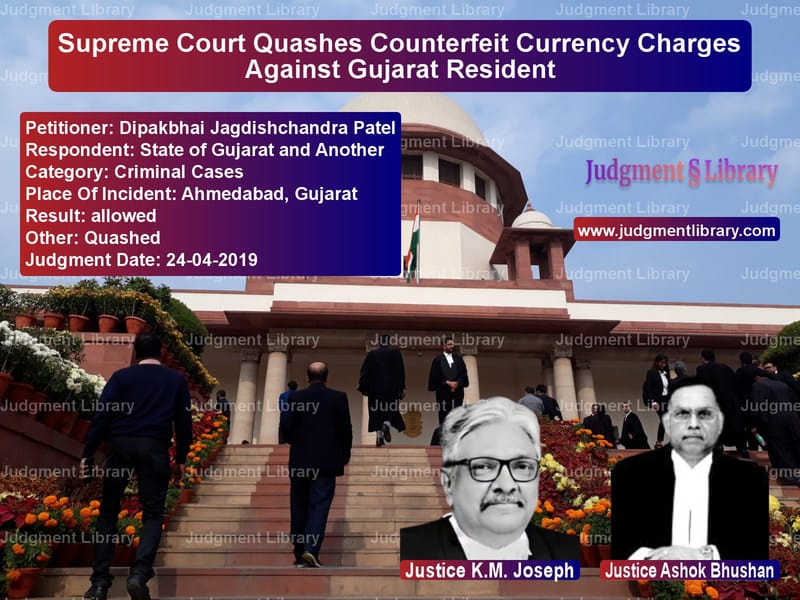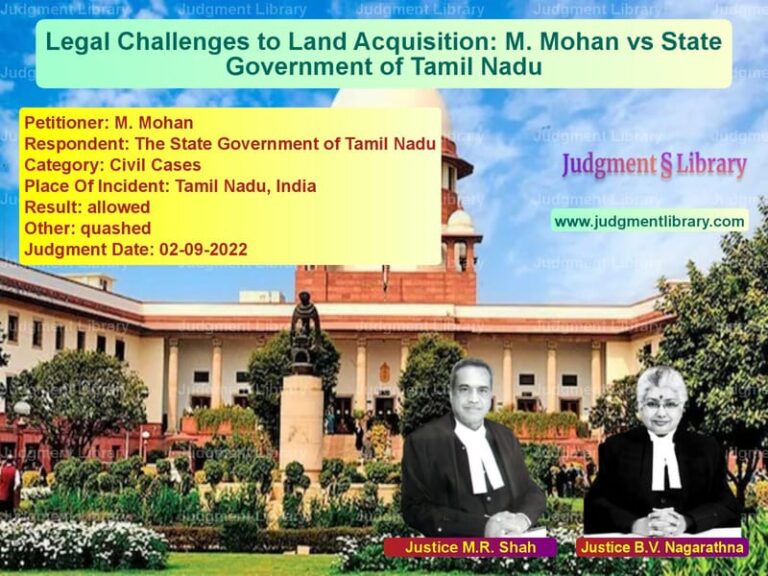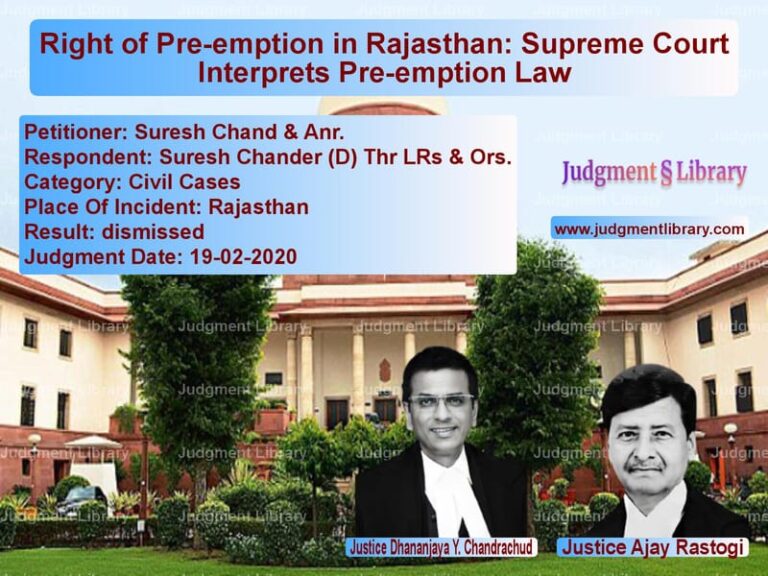Supreme Court Quashes Counterfeit Currency Charges Against Gujarat Resident
The case of Dipakbhai Jagdishchandra Patel v. State of Gujarat and Another involved allegations of involvement in counterfeit currency circulation. The Supreme Court quashed the charges against the appellant, ruling that there was insufficient evidence to frame charges under Sections 489B and 489C of the Indian Penal Code (IPC). The judgment clarified important legal principles regarding admissibility of statements by co-accused, the role of circumstantial evidence, and the scope of judicial intervention under Section 482 of the Code of Criminal Procedure (Cr.PC).
Background of the Case
The case originated from an FIR registered on 10th April 1996 in Ahmedabad, Gujarat. The police received information that certain individuals were attempting to sell counterfeit Saudi Arabian Riyals near Noble Building on Ashram Road. Acting on this tip-off, the police arrested three accused—Mahamad Rafik Abdul Hamid Kadge, Salim Mahebub Shaikh, and Usmangani Mahamadbhai Malek—and recovered 88 counterfeit currency notes of 500 Riyal denomination.
During interrogation, the arrested individuals named Dipakbhai Jagdishchandra Patel as the source of the counterfeit notes. Based on their statements, the police included Patel as an accused under Sections 489B (using counterfeit currency as genuine) and 489C (possession of counterfeit currency with intent to use).
The appellant, Patel, approached the Gujarat High Court under Section 482 Cr.PC, seeking to quash the charges against him. However, the High Court dismissed his petition, holding that there was prima facie evidence linking him to the crime. Patel then filed an appeal before the Supreme Court.
Key Legal Issues
- Whether the charges against the appellant were based solely on the statements of co-accused, which are inadmissible under Section 25 of the Indian Evidence Act.
- Whether the police had recovered counterfeit currency from Patel’s residence or if this claim was factually incorrect.
- Whether the High Court erred in dismissing Patel’s petition under Section 482 Cr.PC.
Arguments by the Appellant (Dipakbhai Jagdishchandra Patel)
- The entire case against him was based on the statements of co-accused, which are inadmissible in law.
- There was no independent evidence to establish that he had any role in the counterfeit currency trade.
- The High Court erroneously assumed that counterfeit notes were recovered from his residence, whereas the recovery was made from a public road.
- The prosecution failed to establish the essential ingredients of Sections 489B and 489C IPC, particularly the appellant’s knowledge that the notes were counterfeit.
Arguments by the Respondents (State of Gujarat)
- The statements of co-accused, though not admissible on their own, could be corroborated by circumstantial evidence.
- The police had reason to believe that Patel was involved in trafficking counterfeit currency.
- The case was only at the stage of framing charges, and at this stage, the court should not conduct a meticulous examination of evidence.
- The standard of proof required at this stage is only the existence of a prima facie case.
Supreme Court’s Observations and Judgment
The Supreme Court reviewed the admissibility of evidence and the legal requirements for quashing criminal proceedings under Section 482 Cr.PC.
Key observations:
- The entire case against Patel was based on the statements of co-accused, which are inadmissible under Section 25 of the Evidence Act.
- There was no recovery of counterfeit currency from Patel’s residence, contrary to what the High Court had assumed.
- The prosecution failed to produce any independent evidence linking Patel to the counterfeit currency.
- Mere possession of counterfeit notes does not constitute an offense under Section 489C IPC unless the accused intended to use them as genuine.
Key Judgment Excerpt:
“Proceeding on the basis that it is a confession by a co-accused and still proceeding further that there is a joint trial of the accused and that they are accused of the same offences… having found that there is no recovery from the residence of the appellant of the counterfeit notes and that there is no other material on the basis of which even a strong suspicion could be aroused, we would find that the mandate of the law requires us to free the appellant from being proceeded against.”
The Supreme Court allowed Patel’s appeal and quashed the charges against him. The Court ruled that the High Court erred in dismissing Patel’s petition under Section 482 Cr.PC.
Implications of the Judgment
- The ruling reiterates that mere statements of co-accused cannot form the sole basis for prosecution.
- The judgment strengthens the principle that courts must scrutinize evidence carefully before framing charges.
- It clarifies the legal distinction between possession of counterfeit currency and intent to use it as genuine.
Conclusion
The Supreme Court’s decision ensures that individuals are not falsely implicated in criminal cases based on weak and inadmissible evidence. The ruling upholds the fundamental right to a fair trial and reinforces the judiciary’s role in preventing miscarriage of justice.
Petitioner Name: Dipakbhai Jagdishchandra Patel.Respondent Name: State of Gujarat and Another.Judgment By: Justice K.M. Joseph, Justice Ashok Bhushan.Place Of Incident: Ahmedabad, Gujarat.Judgment Date: 24-04-2019.
Don’t miss out on the full details! Download the complete judgment in PDF format below and gain valuable insights instantly!
Download Judgment: Dipakbhai Jagdishcha vs State of Gujarat and Supreme Court of India Judgment Dated 24-04-2019.pdf
Direct Downlaod Judgment: Direct downlaod this Judgment
See all petitions in Fraud and Forgery
See all petitions in Bail and Anticipatory Bail
See all petitions in Judgment by K.M. Joseph
See all petitions in Judgment by Ashok Bhushan
See all petitions in allowed
See all petitions in Quashed
See all petitions in supreme court of India judgments April 2019
See all petitions in 2019 judgments
See all posts in Criminal Cases Category
See all allowed petitions in Criminal Cases Category
See all Dismissed petitions in Criminal Cases Category
See all partially allowed petitions in Criminal Cases Category







